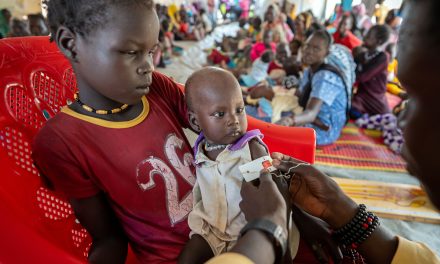
Namibia implements strategies to sustain lion population

By Xinhua
WINDHOEK, July 4 (Xinhua) -- The Namibian government is taking a proactive stanceto protect and sustain its dwindling lion population in the northwestern part of the country, an official said on Monday.Uakendisa Muzuma, an official with the Ministry of Environment, Forestry and Tourism, told Xinhua in an interview that northwestern Namibia's lion population faces threats of human-wildlife conflict and especially drought, leading to a sharp decline in numbers."Population has likely decreased but is stable and healthy," Muzuma added.Lions are pictured at the Etosha National Park in northern Namibia, Aug. 15, 2022. (Xinhua/Chen Cheng)According to the Northwest Lion Population Survey conducted between November 2022 and January 2023, the lion population in northwestern Namibia includes about 35 adult females, 21 adult males and 14 cubs. An additional 400 lions in Namibia's Etosha National Park make up the lion population. "This translates to an occupancy of 0.2 lions per square kilometer. This is extremely low density," Muzuma said.The ministry has since taken significant steps to conserve the lion population through research and monitoring. Under this system, about 70 percent of lions are monitored through collars. "The ministry fitted 45 satellite collars" to give lion rangers, conservancy personnel and activates early warning, he said.The ministry has also activated 347 trail motion cameras and undertaken five deployments, translating to 11,419 camera days and 591 lion images.
A lion is pictured at the Hoanib River drainage in northern Namibia, Feb. 8, 2023. (Xinhua/Chen Cheng)Moreover, it implements tools such as the Spatial Monitoring and Reporting Tool, also known as SMART, to track wildlife in remote areas and identify new lions."Through this, we monitor wildlife at hotspots and near farms through record patrol and initiatives tailored to monitor the human-wildlife conflict," he said, adding that the ministry also built 97 predator-proof kraals in partnership with the Kwando Carnivore Project."Since 2018, human-wildlife conflict incidents have reduced by more than 33 percent annually. Complemented by stringent law enforcement, which resulted in the arrest of six people for illegal lion killing," he said.The ministry also plans to strengthen capacity-building strategies and collaboration to protect the southern African nation's wildlife. "The government continues to invest in conservation efforts, foster partnerships and promote sustainable tourism practices," he added. ■



































